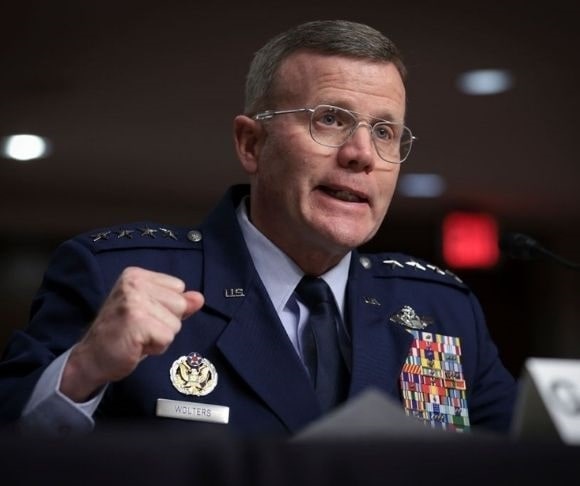What was the US president’s plan during the year leading up to the Russian invasion of Ukraine? Whatever the strategy, the commander-in-chief’s war-fighting commander in Europe, the Supreme Allied Commander, Europe (SACEUR) four-star General Tod Wolters, admitted it was a failure. In testimony before the House Armed Services Committee, responding to Congressman Mike Gallagher’s (R-WI) question regarding the efficacy of economic sanctions on Russia, SACEUR clearly stated US strategy was to “deter and dissuade” but had to concede the fact deterrence had not worked. It had, in fact, “failed.” This brief exchange raised far more critical questions about the Biden administration’s credibility on the world’s stage. Can White House officials get their stories straight? Was there ever a strategy to address the crisis on Ukraine’s border?
When Russian President Vladimir Putin ordered 70,000 combat troops to the eastern border of Ukraine, the Biden administration did nothing. When Putin increased that number to over 80,000, the Biden administration threatened sanctions as a deterrent. The threat of sanctions against Russia and the Kremlin’s oligarchy was supposed to convince Putin the US, NATO, and European Union allies meant business. In December 2021, when Moscow increased the number of soldiers on Ukraine’s border to over 100,000 – along with tanks, armored personnel carriers, and artillery – and moved an equally large force onto the border between Belarus and Ukraine, the Biden administration threatened even stronger sanctions.
The White House was convinced these threats would surely deter the Putin government from invading Ukraine. Instead, on February 24, 2022, President Putin ordered over 120,000 fighting troops across the border. The only logical conclusion is the Russian leader didn’t take Biden’s threats seriously. Looking back over the first year of Biden’s administration, why should the Russian strongman see his American counterpart as a credible leader?
If the president wants to be believable, denials shouldn’t be the only tools in his toolbox. “Let’s get something straight. You remember, if you covered me from the very beginning, I did not say that, in fact, the sanctions would deter [Putin]. Sanctions never deter. You keep talking about that. Sanctions never deter,” Biden explained when asked at a recent press conference why deterrence didn’t work.
The problem with this knee-jerk denial is that his entire administration said economic sanctions on Russia were designed as a deterrence – to “dissuade” Putin from invading Ukraine. Why would the US and its allies even make the sanctions threat before the invasion if it weren’t a deterrence strategy? General Wolters certainly thought sanctions were the deterrence strategy.
 What has focused the spotlight on the current White House national security team’s incoherence has been a series of contradictory statements about what the US hopes to accomplish to bring the war in Ukraine to an end. The recent dust-up over President Biden’s denial that he said sanctions were a deterrent is not the first serious US image-tarnishing gaffe. Remember his off-the-cuff remark at a January 19 press conference that a “minor incursion” by Russian forces into Ukraine would be seen differently in terms of consequences? Not long after the press conference faux pas, Secretary of State Antony Blinken stated emphatically that the US would support Poland in transferring 28 of their Soviet-era MIG-29s fighter jets to Ukraine. Not 72 hours later, Secretary of Defense Lloyd Austin said the US would not support the MIG-29 transfer.
What has focused the spotlight on the current White House national security team’s incoherence has been a series of contradictory statements about what the US hopes to accomplish to bring the war in Ukraine to an end. The recent dust-up over President Biden’s denial that he said sanctions were a deterrent is not the first serious US image-tarnishing gaffe. Remember his off-the-cuff remark at a January 19 press conference that a “minor incursion” by Russian forces into Ukraine would be seen differently in terms of consequences? Not long after the press conference faux pas, Secretary of State Antony Blinken stated emphatically that the US would support Poland in transferring 28 of their Soviet-era MIG-29s fighter jets to Ukraine. Not 72 hours later, Secretary of Defense Lloyd Austin said the US would not support the MIG-29 transfer.
The Biden administration has been a study in failed leadership, failed foreign policy, and – most damaging to the US in the eyes of the world – failure to communicate a coherent and realistic foreign policy strategy. From the moment Joe Biden took the oath of office as president of the United States, the foreign policy of his administration has been opaque. As a result, no credible, consistent message from the president or vice president or the foreign policy team can be relied on. The foundation of credibility is when our national leaders say what they mean, mean what they say, and act accordingly. At a minimum, the president of the most powerful nation in history ought to tell his combatant commander what the plan is.
The views expressed are those of the author and not of any other affiliation.
~ Read more from Dave Patterson.




